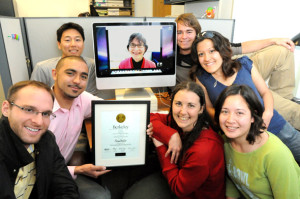Department of Chemical & Biomolecular Engineering
Recipient, Faculty Award for Outstanding Mentorship of GSIs
Background of the Award
Statement of Mentoring Philosophy
Background of the Award
 Each spring graduate students are invited to nominate faculty members for the Faculty Award for Outstanding Mentorship of GSIs. Typically each nomination is supported by several GSIs who have worked with the honoree. The award is sponsored by the Graduate Council’s Advisory Committee for GSI Affairs and the GSI Teaching & Resource Center. Susan Muller received the award in 2011.
Each spring graduate students are invited to nominate faculty members for the Faculty Award for Outstanding Mentorship of GSIs. Typically each nomination is supported by several GSIs who have worked with the honoree. The award is sponsored by the Graduate Council’s Advisory Committee for GSI Affairs and the GSI Teaching & Resource Center. Susan Muller received the award in 2011.
Susan Muller’s Statement of Mentoring Philosophy
Plan for, and facilitate, good communication with the GSIs. Clear and effective communication can make an enormous difference in many situations but is often under-valued. Before the semester begins, I establish a regular weekly meeting time with my GSIs for which we have all allocated sufficient time to have a thoughtful dialogue. In our first meeting, I discuss my aspirations for the course and what my expectations are in terms of their role in the course. I also solicit their thoughts and hopes for what they will take away from the experience, and encourage them to bring their own ideas to the weekly meeting. Once the course begins, the weekly meetings are our venue for discussing what has worked and what hasn’t worked in the preceding week’s lectures, discussion sections, assignments, etc. It is also a time to share resources — ideas for discussion section and future assignments — and identify topics that need further development in the class. Finally, since the students tend to communicate more openly and more frequently with the GSIs than with me, I use the weekly meetings to learn from the GSIs how the students are perceiving the course, and what the students find successful and/or frustrating about the course. Of course, clear and timely communication directly with the students — of expectations, assignments, rules related to late assignments, etc. — is also critical to the success of the course.
The course benefits if you work as a team. Weekly meetings between the GSIs and instructor help forge a sense of shared enterprise and teamwork. Sharing ideas saves time and effort, and can catalyze new ways of thinking about and presenting material. Indeed, when students find something I have presented in lecture unclear, it is often a GSI that comes up with an alternate way of explaining the material.
Create an atmosphere of respect for every person in the classroom. I work to make sure that the students understand the role of the instructor and the GSIs in the course as well as their broader roles within the university as researchers and scholars. I typically teach relatively large engineering classes of 100 or more students. As part of the first lecture, I introduce both myself and the GSIs and briefly describe our research interests outside the course, partly to remind the students that the mission of the University involves not simply dissemination of knowledge through teaching, but also its creation through research and scholarship. In terms of respect for the students, I devote considerable time and energy to preparing for every lecture and office hour and to staying on top of even minor course administrative-organizational details; similarly, I stress the importance of preparation and organization to the GSIs. Keeping the entire teaching team up to date on material to be covered in the next week, key concepts to be incorporated in the homework assignments, collection and grading of homework assignments, and distribution of graded work and homework solutions are crucial to the smooth functioning of the course and to the students learning the material. Sticking to a firm schedule helps the students allocate their time, and makes them more respectful of deadlines the instructors set.